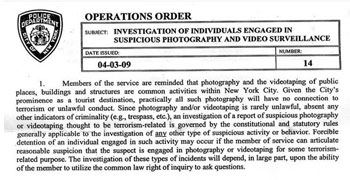Keep this in your camera bag: NYPD memo addresses rights of street photographers and videographers
posted Tuesday, September 4, 2012 at 9:17 AM EDT

In July, we told you about a potentially landmark general order from the Chief of Police in Washington, DC that seemingly protected the rights of photographers to shoot stills or video in public without being arrested. Now, an "operations order" from the New York Police Department has been making the rounds that also addresses the rights of street photographers to do their work in public without being harassed.
Though the memo is from a few years ago -- April 3, 2009, to be exact -- anyone shooting photos in New York City would be wise to have a copy in their photo bag or on their iPhone in the event they are told by the NYPD they can't capture images or video in public.
On the downside for street photographers, some of the language used in the order is fuzzy, indicating that evidence of "suspicious photography" could be grounds for investigation.
You can see part of the memo on the top right of this whole story and the whole order by clicking here.
Some of the key takeaways from the memo include these nuggets:
"Given the City's prominence as a tourist destination, practically all such photography will have no connection to terrorism or unlawful conduct. Since photography and/or videotaping is rarely unlawful, absent any other indicators of criminality (e.g. trespass, etc.), an investigation of a report of suspicious photography or videotaping thought to be terrorism-related is governed by the constitutional and statutory rules generally applicable to the investigation of any other type of suspicious behavior."
"Members of the [police] service may not demand to view photographs taken by person absent consent or exigent circumstances…In addition, a person who has taken pictures should not be directed to delete or destroy images within the device."
What do you think of this NYPD order? Does it make you feel more comfortable photographing in New York City? Or is there enough fuzziness in the language that it still relies on a police officer's judgement call?
Also, we're curious if you feel you've been harassed by the police while photographing in public in the U.S. or elsewhere. Please share your thoughts and concerns in the comments below.
(Via Reddit)